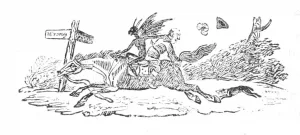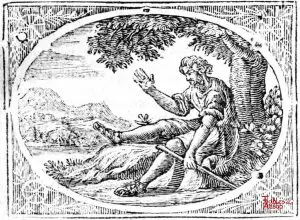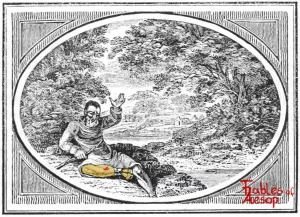A Flea bit a Wrestler who called out to Hercules for help. None came even after the second bite. Seems Hercules answered but said: “No.”
We petition gods for minor matters, yet take offense if such petitions are not granted.

Townsend version
A flea settled upon the bare foot of a Wrestler and bit him, causing the man to call loudly upon Hercules for help. When the Flea a second time hopped upon his foot, he groaned and said, “O Hercules! if you will not help me against a Flea, how can I hope for your assistance against greater antagonists?’

JBR Collection (The Man and The Gnat)
As a clownish fellow was sitting on a bank, a Gnat settled on his leg and stung it. The Man slapped his leg, meaning to kill the Gnat, but it flew away, and he had nothing but the blow for his pains. Again and again the insect alighted upon the leg, and again and again the Man struck at it, each time more savagely than before. His thigh became bruised all over, but the Gnat was still unharmed and lively. Almost mad with rage and disappointment, the fellow burst into tears. “O mighty Hercules!” cried he, “nothing can withstand thy power. Aid me, then, I beseech thee, against this terrible Gnat, which for an hour has tortured me beyond all bearing!”

Samuel Croxall (The Man and the Gnat)
AS a clownish fellow was sitting on a bank, a Gnat settled upon his leg, and stung it. He clapped his hand with great vehemence upon the place, with intention to kill the Gnat; but the little nimble insect, skipping lightly between his fingers, escaped; and every time he struck, he gave himself a smart blow upon the leg, without being in the least able to touch the Gnat. This provoked him very much, so that in the height of his passion, he fell to invoking Hercules. O mighty Hercules! says he, since nothing can withstand thy power, aid me, I beseech thee, against this pernicious Gnat, and with thy invincible strength, subdue him, in compassion to me, miserable creature, who am tormented with his venomous string.
THE APPLICATION
Many people, like the clown in the fable, are apt to invoke the Almighty upon every little trifling accident that befals them. Not in an habitual, umeaning exclamation, such as children and childish folks use, but in a serious, deliberate meditation, conceived in a fit of rapture, and delivered from the closet or cabinet, in the usual season of devotion. How many things are prayed for with much earnestness, which, if we were to enquire into them, are mere vanities, and such as we ought to be ashamed of having! Not that the Supreme Being, who is all-knowing and present every where, can be supposed to be ignorant of every little thought of our souls, or unable to comply wih the multiplicity of our wishes; but it is contrary to his exalted nature to condescend to our paltry, selfish schemes, or to grant any of those petitions, which we ourselves, if we considered, should be ashamed to put up.

Thomas Bewick (The Clown and The Gnat)
As a clownish Fellow was sitting musing upon a bank, a Gnat alighted upon his leg and bit it. He slapped his hand upon the place, with the intention of of crushing the assailant; but the little nimble insect escaped between his fingers, and repeated its attacks. Every time he struck at it, he gave himself a smart blow upon the leg, but missed his aim. At this he became enraged, and in the height of his peevish and. impatient humour, he earnestly prayed to Hercules, beseeching him with his mighty power to stretch forth his arm against a pernicious insect, by which he was so miserably tormented.
APPLICATION.
He who suffers his mind to be ruffled by every little inconvenience, subjects himself to perpetual uneasiness and disquiet. There is no accident, however trivial, but is capable of disconcerting him, and he becomes absurdly miserable on the most foolish occasion. His good humour is soured in an instant, and he is rendered uncomfortable to himself, and odious or ridiculous to all about him. He prays with earnestness to the Supreme Being to aid him in all his paltry selfish schemes, or to gratify vanities, for which, as a rational being, he ought to blush and be ashamed. The imaginary distresses, which his unfortunate disposition heightens into severe calamities, are matter of diversion to those who are disposed to sneer at him; and when his pettish humour makes him rave like a mad-man, and curse his fate, at the dropping of a hat, or the blunder of a servant, even his friends must view his behaviour with a mixed emotion of pity and contempt.


L’Estrange version (A Flea and Hercules)
There was a fellow, that upon a flea-biting call’d out to Hercules for help. The flea gets away, and the man expostulates upon the matter. Well! Hercules; (says he) you that would not take my part against a sorry flea, will never stand by me in a time of need, against a more powerful enemy.
Moral
We neglect God in greater matters, and petition him for trifles, nay and take pett at last if we cannot have our askings.

Pulex, Homo, et Hercules
Cum insiluisset pulex in pedem cuiusdam, ille ad opprimendum hunc Herculem invocavit. Sed cum pulex se illinc mox saltu subduxisset, cum gemitu ille “Hercules,” inquit, “quid ego abs te opis in magnis periculis exspectem, qui contra pulicem adesse mihi noluisti?”
Perry #231

